
Introduction
100th Anniversary Issue
Centennial Harvests:
The College Pump
The Readers Write
The Undergraduate
Harvard Portrait
Bulletin Boards
Boom and Bust: 1919-1936
War and Peace: 1937-1953
Baby Boom to Bust: 1953-1971
Century's End: 1971-1998
Centennial Sentiments
Harvard Magazine
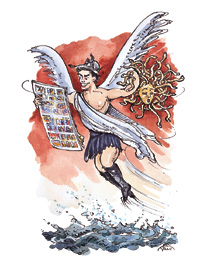
|
|
I have learned as much from Charlie Brown of "Peanuts" as I have learned from Perseus. |
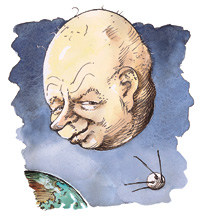
|
|
The Russian sputnik is the result of the American policy of preferring fatheads to eggheads. |

|
|
Near Harvard Yard I used to eat in a cafeteria where the food was very cheap but not very good. I would sit at a long public table where on many occasions there also sat the philosopher Bertrand Russell. One day I did not contain my curiosity. "Mr. Russell," I said, "I know why I eat here. It is because I am poor. But why do you eat here?" "Because," he said, "I am never interrupted." |
Brave New World
We live in a world of guided missiles and misguided men. — Critic John Mason Brown '23, April 19, 1958
The century during which the Chinese had to learn to live with our Western world is past. Now we both have to learn to live on the same planet. — Professor of Chinese history John K. Fairbank '29, LL.D. '70, October 25, 1958

|
Our new way of getting rich is to buy things from one another that we do not want at prices we cannot pay on terms we cannot meet because of advertising we do not believe. — University of Chicago president Robert M. Hutchins, LL.D. '36, April 4, 1959
In foreign policy it is better nine times out of ten to sit still than to do the brilliant thing. — Foreign correspondent Cyrus L. Sulzberger '34, LL.D. '57, April 18, 1959
When people seek freedom, they are always impatient. — United Nations diplomat Ralph J. Bunche, Ph.D. '34, March 19, 1960
I just don't believe that our western society can maintain itself as a beleaguered citadel of opulence in a world of poverty. — Professor of population policy Roger Revelle, March 20, 1965

|
The Establishment isn't what it was, when Harvard University joins the boycott of non-union lettuce. — The Boston Globe, January 4, 1971
Culture and Knowing
If military strength is a nation's right arm, culture is its left arm: closer to the heart. — Composer and conductor Leonard Bernstein '39, D. Mus. '67, October 24, 1959

|
The majority in public life at all levels still tend to talk of culture as if they were telling an off-color story. — Journalist August Heckscher, A.M. '39, July 6, 1963
Ideas are too important to be left to mere intellectuals. — Historian Daniel J. Boorstin '34, LL.D. '93, July 6, 1963
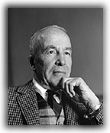
|
Women and Men
I'm earning my Ph.D. by the sweat of my frau. — "J. Fortescue Perley III, 4 Grad.," February 21, 1959
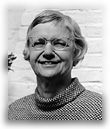
|
The process of acquiring a trained mind takes place best in an environment where there is no awareness of sexual distinctions. — Professor of government and dean of the Faculty of Arts and Sciences McGeorge Bundy, LL.D. '61, June 11, 1960
The college girl of 1961 won't model herself on anyone who has rejected good family life or who has rejected intellectual life to be a housewife in suburbia. — Mary I. Bunting, December 9, 1961
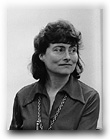
|
The relation of Harvard to its women is similar to that of the missionary to his heathen. And your feelings, if you're a woman who has made it [here], are often similar to those of the heathen imported for cultural development to imperalist shores--a mixture of gratitude, awe, doubt...and resentment. — From How Harvard Rules Women, published by the New University Conference, 1970, May 24, 1971
Higher Education
It is a mistake to think that the primary job of education is to make people happy. The job is to make people think. — Professor of retailing Malcolm P. McNair '16, November 8, 1958
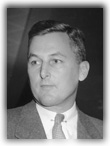
|
No one should be allowed to go to college less than 500 miles from home without good reason. — Professor of social sciences David Riesman '31, LL.B. '34, LL.D. '90, June 6, 1959
The average doctor of philosophy is a model of compulsive cautiousness. — Professor of psychology B.F. Skinner, Ph.D. '31, S.D. '85, November 7, 1959
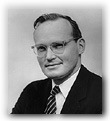
|
If people want glorious and happy weekends, they shouldn't come to college. They should join a labor union. — Professor of Greek literature John H. Finley Jr. '25, Ph.D. '33, L.H.D. '68, November 9, 1963
Like most academics, I have spent half my life taking examinations, and the other half giving them. — Professor of physics Gerald Holton, Ph.D. '48, February 1, 1964
Examinations...may be used to measure not only the quantity of learning but also the quality of teaching. — University professor Paul H. Buck, Ph.D. '35, Litt. D. '46, February 1, 1964
Bull in pure form is rare; there is usually some contamination by data. — Educator William G. Perry Jr. '35, A.M. '40, February 1, 1964
The supposedly natural order of things is that if you are distinguished enough, you neither need learn anything about teaching nor teach anyone less advanced than a post-doctoral fellow. — David Riesman, October 24, 1964

|
The Academic Enterprise
I find that the three major administrative problems on a campus are sex for the students, athletics for the alumni, and parking for the faculty. — University of California at Berkeley president Clark Kerr, LL.D. '58, November 29, 1958
I would certainly warn anyone not to enter teaching if he plans to do so because he thinks the people in it are so nice. — David Riesman, March 21, 1959
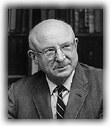
|
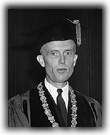
|
Our colleges will be measurably better the day deans become the clerical servants of the faculty. — Author John Ciardi, former Briggs-Copeland assistant professor of English composition, April 21, 1962
Whatever you may have heard about the economic views of some professors, I can assure you that the Harvard administration at budget-time is an unshakable bastion of orthodox economics. — Professor of Arabic Hamilton A.R. Gibb, May 4, 1963

|
Old professors never die,
They just become emeriti.
— Professor of philosophy Henry M. Sheffer '05, Ph.D. '08, January 9, 1965
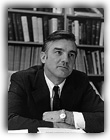
|
At Harvard they humanize scientists; at MIT they Simonize humanists. — Statesman Adlai E. Stevenson, LL.D. '65, March 1972
Today's Youth
Young Americans exist. They must be educated. Whether or not we're pleased with them is irrelevant. — Historian Herbert Wing Jr. '10, September 24, 1960
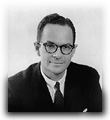
|
First students discovered that non-violence didn't work. Then they discovered that violence didn't work. Now they're about to discover that apathy doesn't work. — Junior Fellow Edward Tenner, December 7, 1970
The Center of the Universe
Harvard's crimson banner is a red flag to everyone else, for no one likes to concede superiority. — Editor Thomas Griffith, NF '43, May 23, 1959
I would rather live in a society governed by the first 2,000 names in the Boston 'phone directory than in one governed by the 2,000 members of the Harvard faculty. — Pundit William F. Buckley Jr., June 11, 1960
Many are culled; few are chosen. — Journalist Charles L. Whipple '35, concerning College admissions, July 2, 1960
Washington has become a town where Yale locks are good but only Harvard keys will open them. — Senator Kenneth B. Keating, LL.B. '23, April 15, 1961
Yes, I admit my son did go to Harvard and my daughter to Radcliffe. But am I responsible for every single thing my children do? — Critic Orville Prescott, January 12, 1963
If you leave Cambridge and during your absence become the first man on the moon, and then assassinate Khrushchev, on your first day back you could meet someone in the Yard who would look at you and say: " I understand you've been out of town." — Professor of political economy Carl Kaysen, Ph.D. '54, February 15, 1964